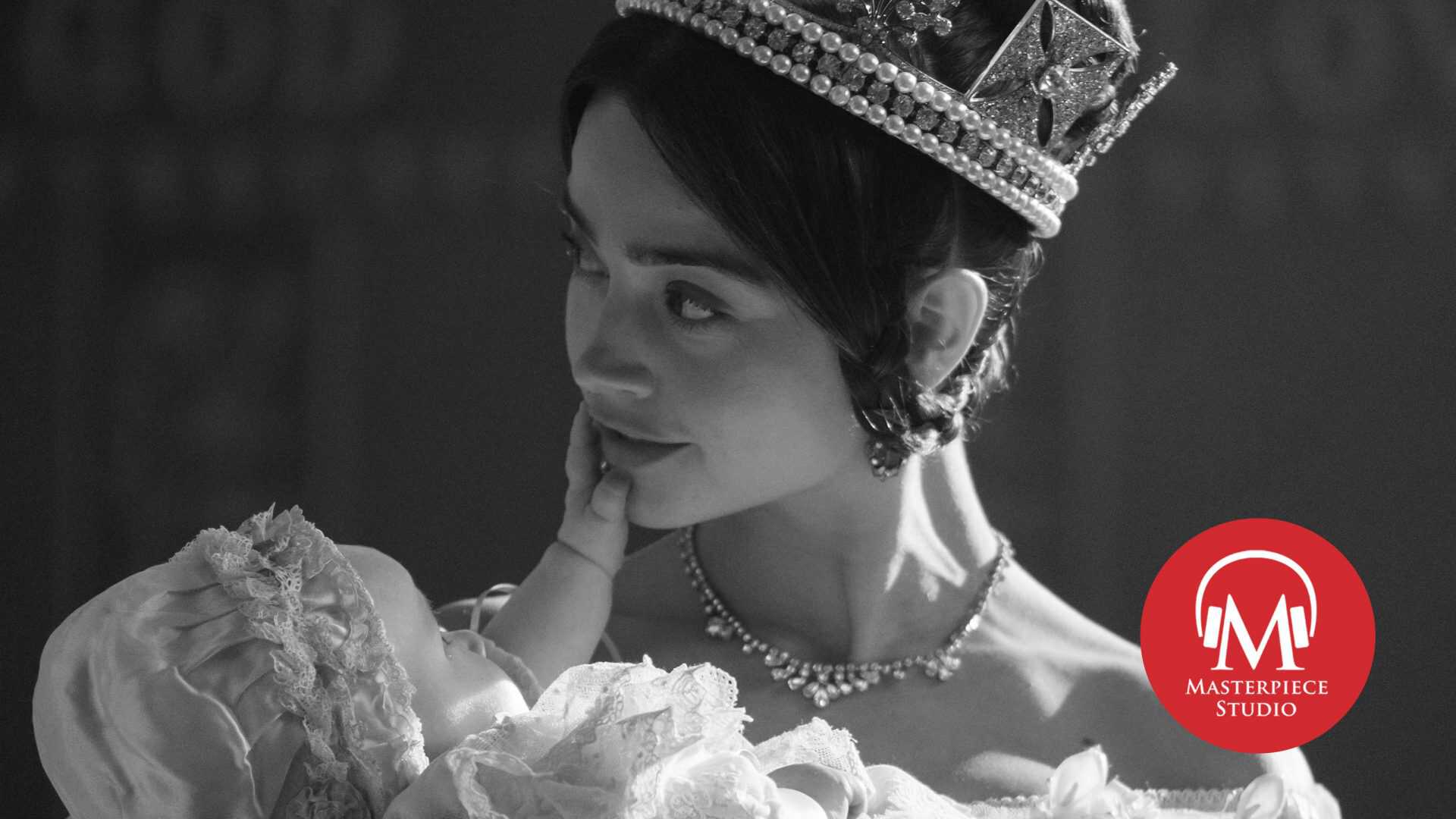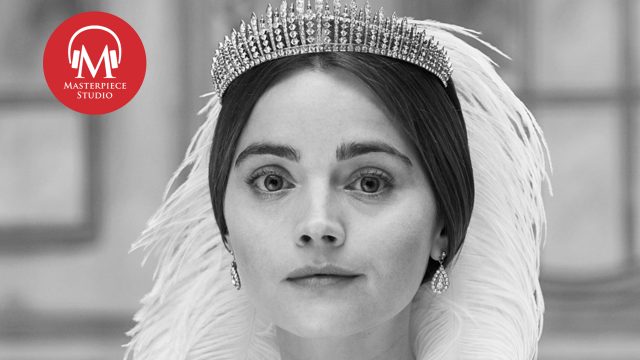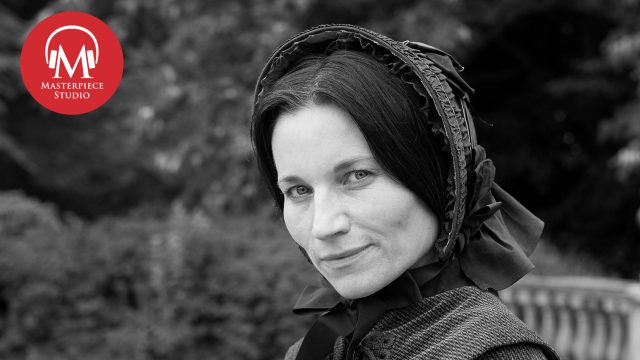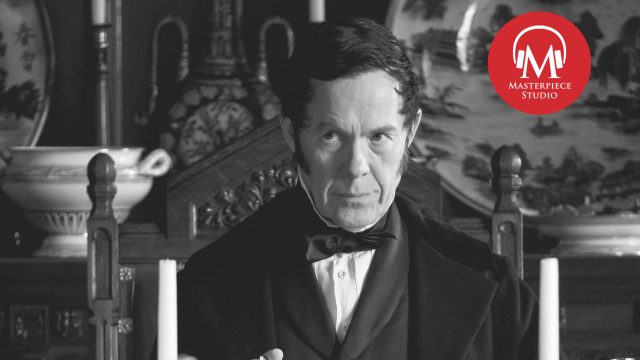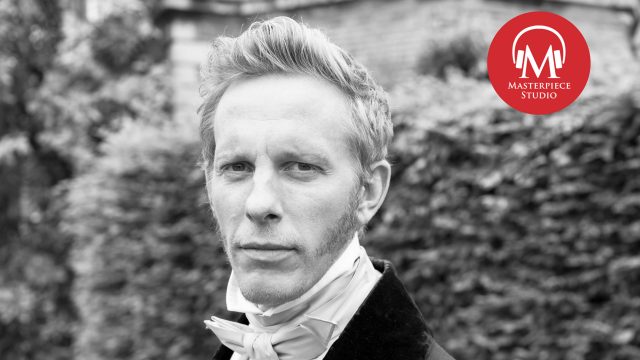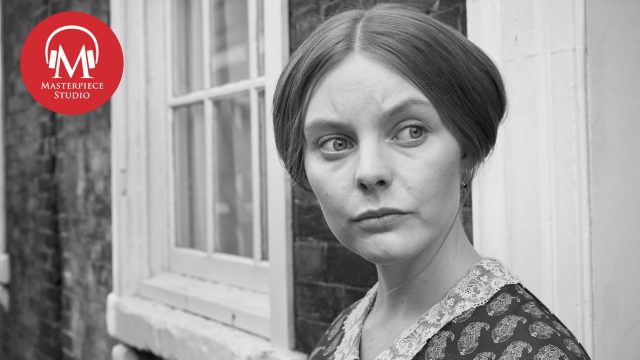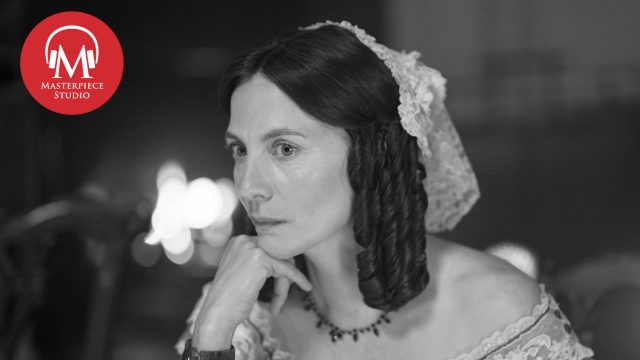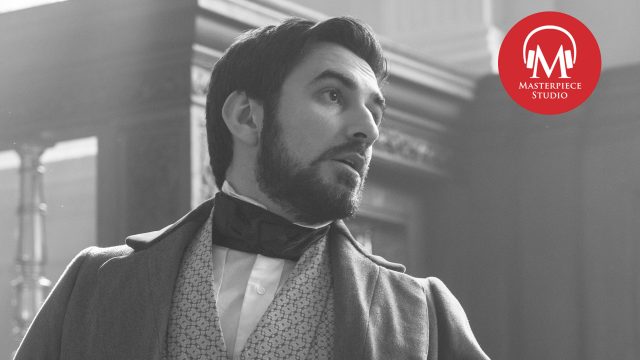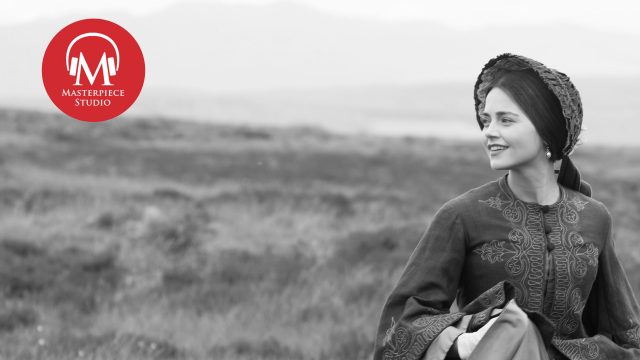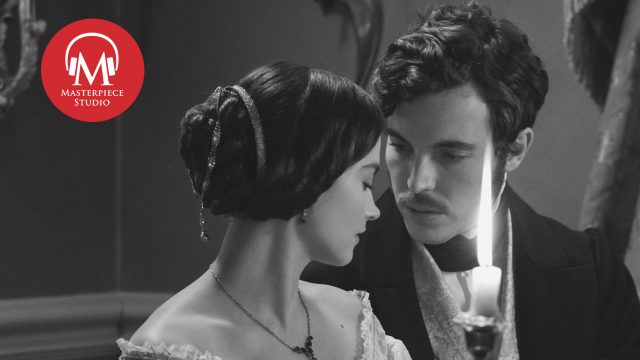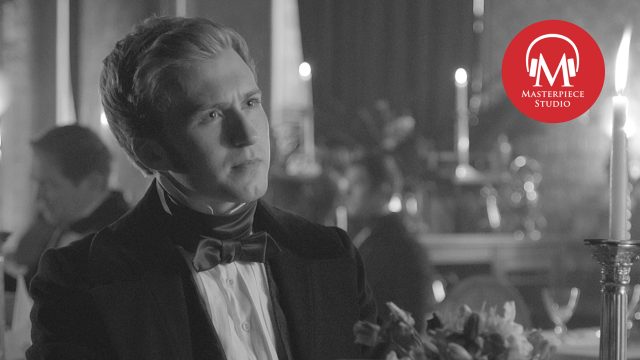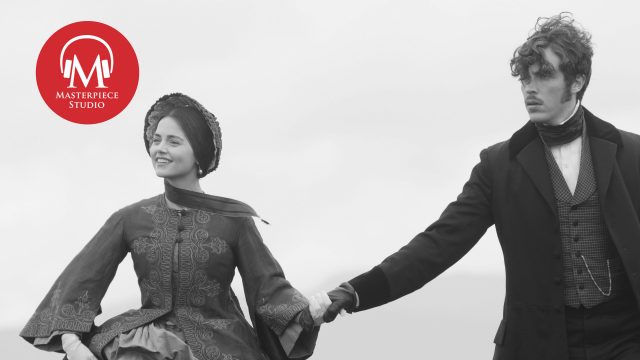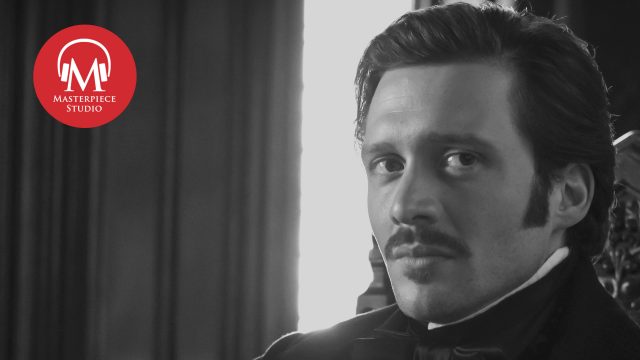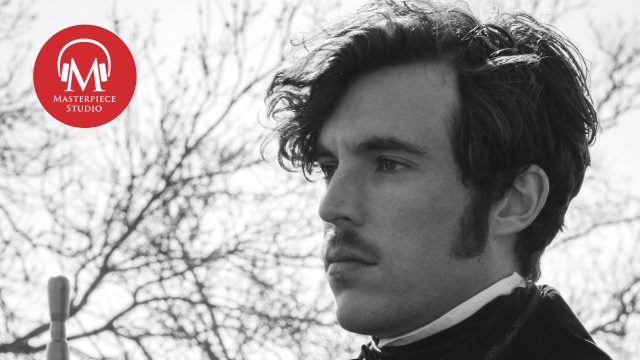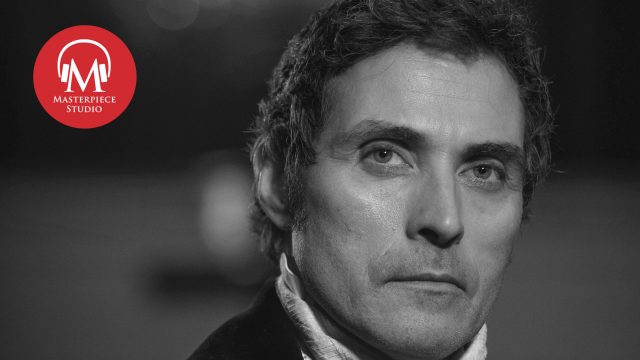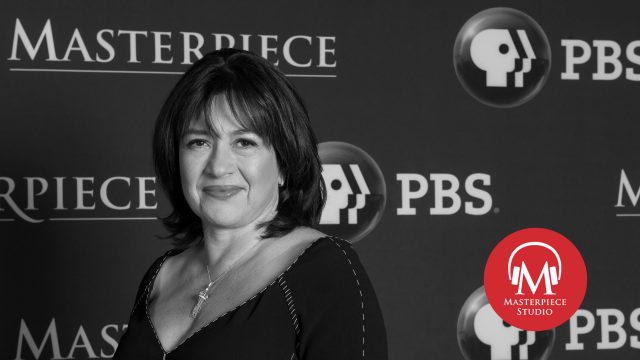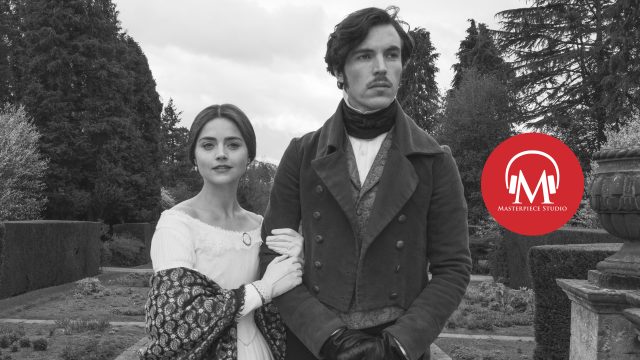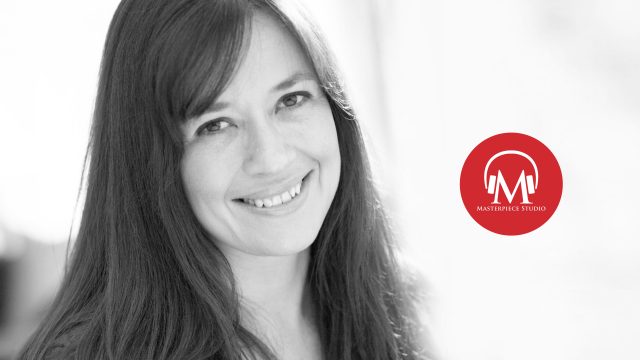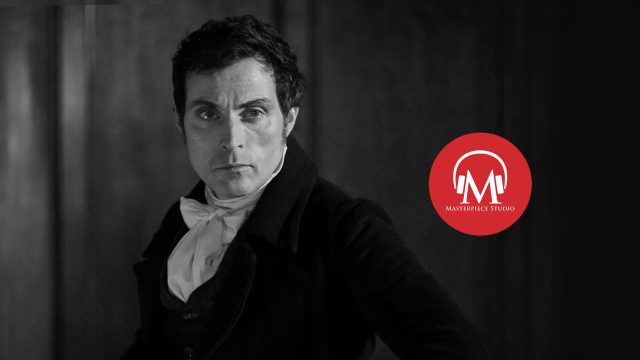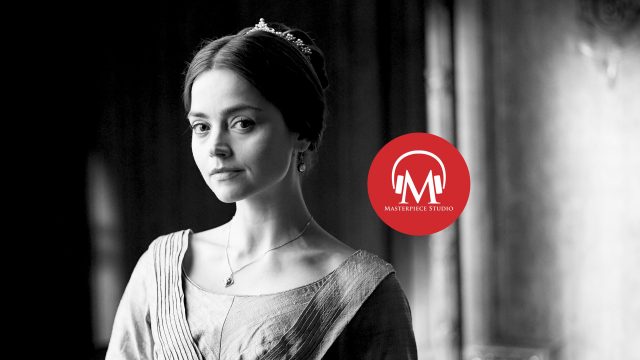Jace Lacob: I’m Jace Lacob, and you’re listening to MASTERPIECE Studio.
Queen Victoria has already faced dangers in many different guises: an assassination attempt, ongoing court intrigue, and a perilous childbirth. After a lengthy post-birth isolation, Victoria rushes to return to her royal duties — only to discover that certain decisions have been made without her. In her absence, Victoria’s husband Prince Albert has found he rather likes being in control, even if he’s confined to his role as Prince-Consort instead of being a real King. And Victoria doesn’t like that at all.
CLIP
Victoria: They’re my soldiers, Albert. I need to know these things. And what’s more, you have no right to keep it from me.
Albert: Forgive me, I was only trying to make your life easier.
Victoria: Oh, is that what you were doing?
Jace: On top of it all, the young Queen wrestles with an altogether more troubling enemy: the great green-eyed monster of jealousy.
CLIP
Victoria: I did not go there to talk about politics.
Albert: Are you so naive that you do not realize that everything you do is political?
Victoria: And what did you do today, Albert?
Albert: I went to the Royal Society.
Victoria: And are you so naive that you think everything you do there is mathematical?
Jace: In a busy, bustling second season premiere, Queen Victoria struggles with national pride, personal ambition, and the roadbumps of a very public young marriage. As Victoria grows into her tripart roles as Queen, wife, and mother, actor Jenna Coleman relishes working through those changes, too.
CLIP
Jenna Coleman: They’re trying to navigate what is a personal marriage where the woman is the boss in a time and that was never the case. And yet also on a business level they’re operating within that sphere as well.
Jace: We spoke with Jenna during her recent stateside visit. And later, show creator Daisy Goodwin joins us for an exploration of historical fact and fiction on the Victoria screen.
Jace: And we are joined this week by Victoria star Jenna Coleman. Welcome.
Jenna: Thank you.
Jace: Following the birth of the Princess Royal, Victoria is once again prevented from even walking down the stairs. Does this feel infantilizing to her as though she is once again trapped in the Kensington system, by her husband this time rather than Conroy?
Jenna: Exactly that. I think she is about to burst when we first meet her. She’s incredibly frustrated. Confinement I wasn’t particularly aware of, but is, after having a baby you basically have to lie down for a month while everybody does everything for you and you not move. And she wants to get back to work and everybody is looking after her baby, and I think that doesn’t suit Victoria at all.
CLIP
Victoria: This is ridiculous.
Duchess of Kent: Drina, it is too dangerous. Please.
Victoria: I may have had a baby. But I am quite capable of walking down the stairs.
Jace: Victoria triumphantly leaves her bath chair to skip down the stairs and further rebels with a horse chase between her and Albert, which then leads them undressing each other before they are interrupted. While they did have nine children, just how passionate were these two in real life?
Jenna: I think they were incredibly passionate. I think they were very much in love. I think they were very attracted to each other. Victoria writes very frankly and very candidly in her diary. You know, obviously it’s so part of their relationship, how they operate with each other. It’s fiery arguments and they’re incredibly passionate about each other and I think that’s kind of what kind of leads to the fireworks as well, in many ways.
Jace: Albert is extremely unwilling to relinquish control of the boxes back to Victoria claiming that he doesn’t want to quote distress her at this delicate time. What do you see as the truth behind Albert’s motivations there?
Jenna: I think Albert is a very ambitious man, he has a great vision for the future. He is equally frustrated that he isn’t doing more, when he knows he’s capable of so much. So whilst I don’t think he’s being manipulative, I think, you know, there is also while Victoria is pregnant and is nursing, there’s an opportunity for Albert to do what he really wants to do, which is you know, make history and really bring forth the revolution and that’s kind of what he sets his mind to do. He’s an incredibly capable and clever man.
Jace: I mean, but given that that capability and cleverness, why is he still so insecure about his position both within the palace and within his marriage?
Jenna: It’s very unconventional that a man would not be the master in his own house. Not only that, he’s German, he’s come over to England. Culturally everything is different, and it takes awhile for him to be fully accepted. He doesn’t have a title or as much money as the previous consorts who’ve gone before him. So I think it takes a long time for Albert to find his place and to find his real home, I suppose.
Jace: The most surprising moment in this episode for me was the churching. What did you make of this custom and how does its emphasis on sin further underpin the struggles of Victoria faces on a daily basis?
Jenna: I mean it is really it’s very interesting the whole confinement and being churched and I do I very much enjoy what Daisy’s written and Victoria’s reaction to having a child and you need to cast out your sin afterwards. It’s quite shocking to think, really, it’s not that long ago, and even the Queen of England has to be churched.
Jace: And she says at one point, ‘I’m not a woman, I’m a queen.’ Is that the eternal tug of war within her at all times, do you think?
Jenna: No. To be honest I think, I think very much it’s, it’s I’m not a queen I’m a woman, really. I think that’s that’s probably more prevalent to Victoria, I think. If you look at all of her portraits, you know, often many of the family portraits are more stately or it’s more, Albert has a position of prominence and Victoria looks more like, you know, the wife with her hand on his shoulder or she stood up while he sat down, and I think I think to me it looks as if, you know, she’s making up for something there. And she’s making up for wanting to be a wife to Albert and a woman, and as we as we looked in series one, an ordinary woman. I think you know, in lots of ways I think if you feel, you know, everybody curtsies to you and there’s a distance or there’s a manipulation or somebody wants something from you ,and sometimes, I think, that would make you just want someone to make you laugh. And I think that’s why Lord M, for example, was such an important relationship to her, because she was treated as an equal and a friend and a colleague, and not just as a queen.
Jace: Why is Victoria so threatened by Lady Lovelace and her music of the spheres?
Jenna: I think — it’s because she’s pregnant primarily, and she’s devastated by that fact because she feels she is being removed from her own life and removed from Albert and removed from her day job. And also, she’s educated in a way that Victoria is not, and it’s something Albert feels very passionate about and it’s something you know, which Victoria cannot engage with or connect with him on that level because I think her intelligence lies in a different way, and you know, she perhaps isn’t as logical or mathematical in her thinking, whereas Albert is, so I think that’s kind of where it comes from.
Jace: I love the fact that that jealousy is mirrored in the performance of Othello leading Victoria to admit that she doesn’t understand why Othello strangles Desdemona. It’s Lord M that says, ‘Jealousy is a most tedious emotion.’ Does she not see the irony here, in terms of her own jealousy?
Jenna: No, I don’t think she does because I think, at that point I think she is lost in her own in her own dealings with finding out she is pregnant, only a month after giving birth to her other child. So I think she is perhaps impulsive and irrational and she doesn’t in that moment realize that jealousy is what she is feeling. It’s not towards the end of the episode where she’s had a minute to kind of acknowledge her wrongdoings, potentially, but in the heat of things I don’t think Victoria is anything other than the feeling that she is right.
Jace: And how terrifying is that realization for the Queen that she’s pregnant again?
Jenna: Very, very, very much so. I think having just given birth is not what she was expecting or having given birth to her first baby I think she was expecting she wanted to be Queen for longer without interruption. She wanted to be married and enjoy the first couple of years of honeymoon with her husband. And I think she’s incredibly frustrated she wrote, ‘It’s the only thing I dread.’ And it was a real source of misery for her. She hated pregnancy. She hated not being able to go out riding, and not being free. And the feeling that everybody else would take over her and baby her and look after her and take her back to what was essentially the Kensington System. It makes her feel trapped and like she’s in jail, I suppose.
Jace: Victoria and Ada both subvert society’s expectations for themselves. When Victoria goes to see the differential engine, and encounters Lady Lovelace, does the Queen sees some of herself within the mathematician? Are they perhaps both women in a man’s world?
Jenna: Yes, they are. I think it’s the realization that she can connect and she can engage with Lady Lovelace on a very similar level. They both experience you know, trying to navigate being women having children in what is very, very, very much a man’s world.
CLIP
Victoria: I did not know you had children.
Lady Lovelace: Three of them. I think I would have got much further with my work here if I had not been so blessed, but, motherhood is not compatible with mathematics
Victoria: You don’t think it’s a woman’s destiny to marry and have children?
Lady Lovelace: There are times, ma’am, when I wish I’d been born a man.
Victoria: You are not alone in that, Lady Lovelace.
Jace: Now how would you describe Victoria’s relationship with the Duchess of Buccluech, and what can you tease about where it might be going this season?
Jenna: I think the initial reaction is not quite what Victoria had expected I think in all honesty Victoria probably tries to avoid her at all costs to begin with. And then that’s what I do love about the relationship, is it takes quite an unexpected turn and I think she grows to be very fond of the Duchess Buccleuch and seeks her advice and her counsel and finds her to be rather hilarious. I think she, she has quite a soft spot for her, although would perhaps be reluctant to admit it.
Jace: What was it like acting opposite Dame Diana Rigg in these scenes?
Jenna: Great, she’s hilarious. The crew love her. I mean she’s just a complete pro and very, very funny. She has amazing stories. I’ve worked with Diana before, on Doctor Who, where we were both dressed in Victorian clothes, except for she had a creature attached to her chest by prosthetics and was threatening to take over the world. So it is a bit of a different set up, but you know, similar costumes.
Jace: Before this next question, a brief word from our sponsors…
Masterpiece Studio is brought to you by Viking. Explore the world in comfort, by river and sea. Learn more at vikingcruises.com
Jace: We learn this week that Victoria is still keeping up a correspondence with Lord M, which drives a further wedge between the queen and Albert who goes so far as to call their relationship unconstitutional. Why do you think Albert is so angered by Lord M’s continued presence in Victoria’s life?
Jenna: I think for a couple of reasons.I think politically, it is unconstitutional and I think, you know, Albert can be a stickler for the rules. And also that she is going to him to ask for advice and seeking his counsel and not going to a husband where he is more than willing and very open, and wants to actively be involved. But Victoria is still keeping him at an arm’s length when it comes to business. And I think that’s incredibly infuriating and frustrating for him.
CLIP
Lord M: Do you remember when you asked for the title of King Consort for the Prince?
Victoria: You said that once people got into the way of making kings they would get into the way of unmaking them.
Lord M: Yes, well, there was another reason. I did not want you to be overshadowed, ma’am. Yes, the Prince is your husband but you are the Queen.
Victoria: He thinks he would do it better.
Lord M: Well, he wouldn’t be the first man to underestimate a woman, would he?
Jace: What was it like having Rufus Sewell return in the role of Lord M?
Jenna: I love having Rufus around. It’s an amazing relationship, and I love working with Rufus, I love doing scenes with Rufus. We just giggle and laugh, and he’s a great fellow acting partner. You feel very safe, he makes the job very easy for you, because you just have to look at him and he gives you everything. It’s been wonderful to explore that relationship more because it’s a very, very full one.
Jace: What do you make of viewers’ we’ll say passionate interest in Victoria and Lord M’s dynamic?
Jenna: I mean I totally understand it. I didn’t expect it to take off in the way that it did do but I can completely understand why and because it’s it’s two people that just love each other and adore each other and love hanging out. It’s very, it’s very blurred. They’re each other’s best friends, they’re each other’s Queen and Prime Minister to their colleagues, and yet he’s like an uncle and also a friend, and like a dad. And also, you know, there feels to be something else there. So it just feels very very complicated, yet they’re just incredibly bonded.
Jace: Victoria asks Lord M for advice and she says, ‘I find myself in a difficult position. I am a queen and a wife and to be a queen I must rule yet to be a wife, it seems I must submit.’ Do you see that as perhaps a sort of meta statement for the series itself? Is that of the underlying struggle?
Jenna: I think potentially throughout Albert and Victoria’s entire relationship it might be. I think they’re trying to navigate what is a personal marriage, where the woman is the boss in a time where that was never the case. And yet also on a business level they’re operating within that sphere as well. So I think how to be a Queen and how to be a wife are the two things mutually exclusive.
Jace: Now my favorite scene in this episode is the final scene at the summer house where Victoria and Albert kissed in season one. Victoria says that childbirth is the ‘shadow self’ of their marriage, which is a heartbreaking line. What was it like filming this pivotal scene in capturing this very heavy emotion and love that these two share?
Jenna: That’s quite hilarious as I think, I think that was within like the first week of shooting and we’d got like the lines the night before and we hadn’t shot anything else from that episode yet. So it was very much like jumping in at the deep end. But it’s an interesting dilemma to be caught. To be pregnant with the person that you love dearly and so sincerely, and yet to be so unhappy because you don’t want to be. And I think it’s a really interesting dilemma and of that time, of women and pregnancy and trying to not get caught, as she called it.
Jace: Well Jenna, thank you so much.
Jenna: Thank you. Good to chat.
Jace: Daisy Goodwin joins us now for a quick journey down the historical rabbit hole in this second season of Victoria. We are joined this week by Victoria creator Daisy Goodman. Welcome.
Daisy Goodwin: Hey Jace.
Jace: So we talked about this very briefly, about the churching of women.
Daisy: Yeah.
Jace: So that she could be, Victoria could be delivered from quote, ‘The pain in peril of childbirth and that she could cast out her sin.’ What was Victoria’s reaction to this rite? Does she discuss it in the diaries?
Daisy: I found this book which was basically a court circular, which just told you all things that she did on every day, and I discovered…because it’s not really mentioned ever in the biographies, or really in the diaries, so she says she was churched, and I just thought, ‘Churched? Really?’ So I just sort of imagined how she would feel about that. I am not sure whether she was churched for her other children. She might have been’ but my guess is that she would have found it slightly peculiar ceremony. You know as she says, as I have her say, you know, ‘What does the Archbishop, you know, the Archbishop of Canterbury know about it?’ I mean she was, I think it’s a very old idea, and maybe I’m bringing some of my own prejudices to Victoria here.
Jace: We see Babbage’s differential engine at work and we learn about his and Lady Lovelace’s work on the analytical engine, which is sort of a prototypical mechanical computer. Was it ever completed?
Daisy: No sadly it wasn’t…somebody did build an engine, which you can see in the Science Museum in London and I went to have a look at it. It is a very beautiful thing. I mean it is, you know it is, you can see the the sort of Platonic ideal at work. But it was never completed because Babbage fell out with his benefactors, and he was a very difficult man. But there is no doubt that they had imagined the future, those two. And it’s so interesting, you know, that this woman who was Byron’s daughter had the sort of visionary ability to see so far into the future. And you know, it’s interesting, because in those days, computers was the name that you would use for people who added up sums, and they made me take that out of the script because it would be too confusing for people. But you know they do, actually I had this line, you know, ‘There’ll be a time when we won’t need computers because we’ll have this machine,’ so you see what I mean. It’s quite fun.
Jace: Of the 4,000 British soldiers who left Kabul, did only one survive the ambush at Gandamak?
Daisy: Yes that is absolutely true Dr. Brydon. And yeah that was a terrible, terrible chapter in British history. You know, it’s the classic story of the British, the Russians, the Americans underestimating the skill and the ferocity of the Afghans. And it’s the classic story of imperial power takes on small nation, you know, in guerilla warfare. Guess who wins? And you know, they were all massacred, it was a terrible, terrible thing. I mean, I think there may have been some civilian survivors but I think all soldiers were killed apart from Dr. Brydon. And there is this very famous painting done later by Lady Butler of this man who only survived because he had a copy of Blackwood’s Magazine in his helmet, and because it had been frozen stiff, it stopped the bullet from piercing his head.
Jace: Did Prince Albert design a military helmet?
Daisy: Yes he certainly did, yes. For some reason, everyone the word helmet funny, but he absolutely did. He was such a polymath, you know, he turned his hand to everything. I mean probably quite irritating if you were in the army and the prince says, you know, ‘Look at my wonderful helmet designs!’ But one of the things he said was perhaps it would be a good idea of if the British Army didn’t wear red on the battlefield because it is quite conspicuous. So you know, it’s helmets were very practical. But as Victoria says, ‘They were not splendid.’ So you know, I suppose I’ve used Albert and Victoria there to illustrate, you know, the two things going on — in the Army and in everything else, which is tradition vs. modernization, efficiency and so forth.
Jace: ‘I feel like I am going back to prison,’ Victoria says. Did the thought of having a second child truly terrify Victoria all over again?
Daisy: Yes it really did. I mean if you only read her diaries and not so much her diaries, actually when you read her letters later to her daughters when they’re beginning to have children, she said, ‘Oh god! You know, the thing I really regret is I didn’t have time between my pregnancies, I didn’t have enough time to enjoy being married before I was constantly having children.’ So I think she was horrified by the idea that she’d been caught again, so, so soon after the first baby.
Jace: Would Francatelli really have used a bundle of birchwood twigs.
Daisy: Yes.
Jace: To beat egg whites?
Daisy: Yes, that’s absolutely correct. I don’t know when the egg whisk was invented but that’s how they used to get, that’s how they used to whip up egg whites was using a bundle of birch twigs, and isn’t that amazing? So no wonder they invented the whisk, but you know apparently it was very effective. I just, that’s one of the details — once I found that out I thought, I’ve got to put that in somewhere.
Jace: I mean that seems straight out of Escoffier.
Daisy: Yeah, yeah I know. I mean I don’t know it’s just extraordinary. But I mean I suppose anything can whisk you if you do it for long enough, but I just, I had to put that in. I just thought it was so glorious.
Jace: You can catch a full interview with Goodwin in our next episode, appearing in your podcast feeds next week.
While you wait for the next podcast episode, be sure to subscribe to MASTERPIECE Studio on Apple Podcasts, Stitcher, or anywhere else you find podcasts. And in this new year, make a resolution to leave a review of the podcast wherever you listen, so that other MASTERPIECE fans can discover MASTERPIECE Studio for themselves.
The VICTORIA Sweepstakes is happening now through March 15, 2018! Enter daily at pbs.org/sweepstakes for a chance to win the Grand Prize, a Viking Ocean cruise for two adults in the British Isles. You may also win monthly prizes of VICTORIA merchandise. For Official Rules, including eligibility restrictions and prize limitations, visit pbs.org/sweepstakes. Void where prohibited.
MASTERPIECE Studio is hosted by me, Jace Lacob and produced by Nick Andersen. Elisheba Ittoop is our editor. Special thanks to Barrett Brountas. Susanne Simpson is our executive producer. The executive producer of MASTERPIECE is Rebecca Eaton.
Sponsors for MASTERPIECE on PBS are Viking Cruises and The MASTERPIECE Trust.








